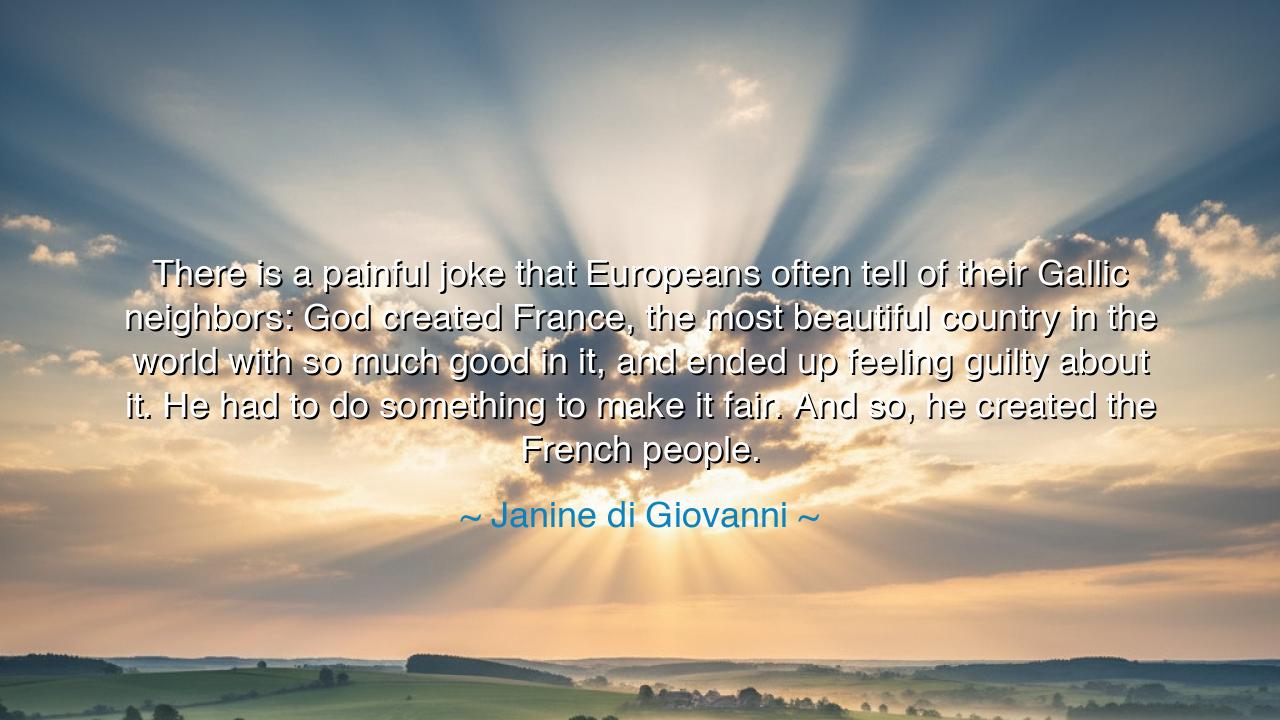
There is a painful joke that Europeans often tell of their Gallic
There is a painful joke that Europeans often tell of their Gallic neighbors: God created France, the most beautiful country in the world with so much good in it, and ended up feeling guilty about it. He had to do something to make it fair. And so, he created the French people.






“There is a painful joke that Europeans often tell of their Gallic neighbors: God created France, the most beautiful country in the world with so much good in it, and ended up feeling guilty about it. He had to do something to make it fair. And so, he created the French people.” — thus spoke Janine di Giovanni, the war correspondent and writer whose sharp eye has seen the paradox of nations and the irony of human nature. Though she cloaks her words in humor, this jest carries the ancient weight of truth: that beauty and flaw, grace and pride, blessing and burden are bound together in every creation — and perhaps most vividly in the French spirit itself. What begins as laughter becomes reflection, for behind the joke lies the eternal pattern of balance that the Divine seems always to maintain.
In this painful joke, we find not cruelty, but the mirror of the human condition. France, that land of sunlight and vineyards, of poetry and revolution, of reason and romance — was said to be crafted too perfectly by the hand of God. Its mountains rise with majesty, its rivers sing, its art stirs the soul. Yet, to keep the world in harmony, so the jest goes, God added a touch of contradiction — the people themselves: proud, argumentative, brilliant, and defiant. The humor hides a universal wisdom — that perfection, left unchecked, must be humbled by imperfection. Where beauty abounds, there must also dwell complexity; where heaven touches earth, humanity must leave its mark.
The origin of this quote lies in the long-standing reputation of the French — admired and envied, loved and mocked in equal measure by their neighbors. Across Europe, they have been both the flame of civilization and the thorn of arrogance. Their genius in art, philosophy, and culture is unquestioned, yet their pride and self-assuredness have often provoked irritation. In this tension, di Giovanni finds a metaphor for divine justice: even the most favored gifts come with a balancing weight. The land may be Eden, but its people are restless, questioning, and fiercely self-aware — and in that restlessness lies their charm and their curse.
Consider the story of Napoleon Bonaparte, that son of France whose ambition once shook the world. He was the embodiment of this divine irony — brilliant and visionary, yet consumed by his own greatness. Under his hand, France rose to glory, but his very genius led her into ruin. Here again, we see the pattern of the quote unfold: God gives the gift, and then gives the flaw that tests it. The beauty of France was matched by the fire of the French spirit — a fire that builds and burns, creates and destroys, loves and rebels in the same breath.
But di Giovanni’s wit does not mock France alone — it speaks of all nations, all peoples, all souls. For who among us is not born into contradiction? Each person is a landscape of beauty and folly, of divine gifts and human flaws. The Creator gives wisdom, but also doubt; courage, but also fear. This is how balance is maintained in the moral universe — not through perfection, but through harmony between light and shadow. What France is to the world, each of us is to ourselves: a creation both glorious and maddening, gifted and imperfect, radiant and restless.
There is also tenderness hidden in this jest. To say that God created beauty and then created humanity to balance it is to admit that our flaws are not accidents, but part of the design. The pride, the stubbornness, the passion — these are not errors, but energies. They give life to the beauty they disturb. Without the French people, France would be only a painting — still, silent, lifeless. But with them, it becomes a living symphony: noisy, dramatic, unpredictable, and magnificent. So too in life: it is our imperfections that give meaning to our gifts, our friction that makes light visible.
The lesson, then, is this: embrace the paradox. Do not despise the flaw that complicates your gift; it may be the very thing that keeps you human. Just as France’s splendor is balanced by the temper of her people, so every virtue must live alongside its shadow. Pride may protect passion; doubt may deepen wisdom; imperfection may preserve humility. The world is not divided into good and bad creations — it is one tapestry, woven with contrast, made beautiful by its unevenness.
So laugh, as Janine di Giovanni laughed — but understand, as the wise have always understood, that the divine joke is not mockery but mercy. God created beauty, and then He created humanity — not to ruin it, but to remind it that even the most blessed of lands and souls must remain grounded. Therefore, be grateful for your contradictions. Cherish the roughness that keeps your light from blinding you. For in every gift, God plants a challenge — not as punishment, but as balance. And in that balance lies the secret harmony of the world: that even perfection needs imperfection to be divine.






AAdministratorAdministrator
Welcome, honored guests. Please leave a comment, we will respond soon